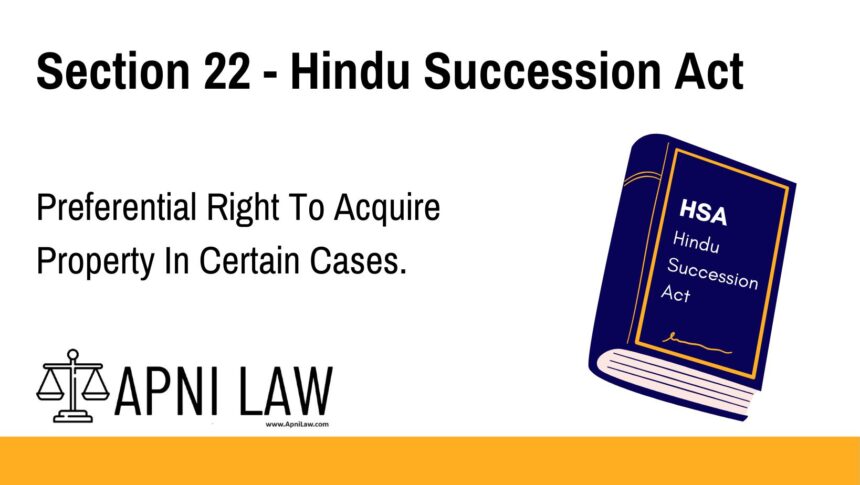Code: Section 22 – Preferential Right to Acquire Property in Certain Cases
(1) Where, after the commencement of this Act, an interest in any immovable property of an intestate, or in any business carried on by him or her, whether solely or in conjunction with others, devolves upon two or more heirs specified in class I of the Schedule, and any one of such heirs proposes to transfer his or her interest in the property or business, the other heirs shall have a preferential right to acquire the interest proposed to be transferred.
(2) The consideration for which any interest in the property of the deceased may be transferred under this section shall, in the absence of any agreement between the parties, be determined by the court on application being made to it in this behalf, and if any person proposing to acquire the interest is not willing to acquire it for the consideration so determined, such person shall be liable to pay all costs of or incident to the application.
(3) If there are two or more heirs specified in class I of the Schedule proposing to acquire any interest under this section, that heir who offers the highest consideration for the transfer shall be preferred.
Explanation.—In this section, “court” means the court within the limits of whose jurisdiction the immovable property is situate or the business is carried on, and includes any other court which the State Government may, by notification in the Official Gazette, specify in this behalf.
Explanation of Section 22 of the Hindu Succession Act
Section 22 of the Hindu Succession Act grants Class I legal heirs a preferential right to acquire the share of another heir in any immovable property or business left behind by a deceased Hindu who died intestate (without a will). This provision promotes family unity and prevents outsiders from acquiring a share in family property or business.
The law applies when:
- The property or business is inherited by two or more Class I heirs.
- One heir intends to sell or transfer their share.
- The other heirs are given the first right (also known as the “right of pre-emption”) to purchase that share before it is sold to an outsider.
If the heirs cannot agree on the value of the share being sold, the court will determine the fair consideration. If multiple heirs want to purchase it, the one who offers the highest amount will be given priority.
Illustration
Example 1: Brother Selling Share in Ancestral House
After their father’s death, three siblings inherit equal shares in an ancestral house. One brother decides to sell his share. Under Section 22, the other two siblings have the first right to buy his share. If both are interested, the one offering a higher price will be given preference.
Example 2: Business Succession
A father and his two sons jointly operated a textile business. After the father’s intestate death, all three Class I heirs (wife and two sons) inherit shares. If one son wants to sell his stake, the other son and the mother have the right to purchase it before it’s offered to a third party.
Common Questions and Answers on Section 22 Hindu Succession Act
1. What is the main purpose of Section 22?
The main objective is to preserve family property and business by giving Class I heirs the right to buy another heir’s share before it is sold to someone outside the family.
2. Can Class II heirs claim this preferential right?
No, this right is available only to heirs specified in Class I of the Schedule to the Hindu Succession Act.
3. What happens if multiple heirs want to buy the same share?
The heir who offers the highest consideration will be given preference, as per sub-section (3) of Section 22.
4. How is the value of the share determined?
If the parties cannot agree, the court will determine the fair market value of the share.
5. What if none of the other heirs want to buy the share?
In that case, the selling heir is free to sell the property or business interest to any third party.
Conclusion
Section 22 of the Hindu Succession Act serves as a protective shield for joint family property and business interests. It ensures that Class I heirs get the first opportunity to retain such interests within the family, thereby minimizing the chances of conflict and fragmentation of family assets.
For more legal updates, property succession advice, or help in drafting succession documents, visit ApniLaw today.








